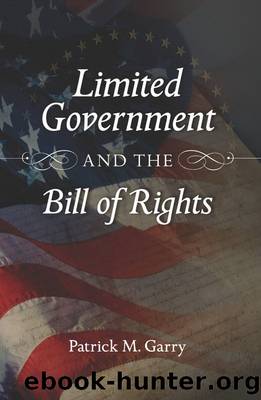Limited Government and the Bill of Rights by Patrick M. Garry

Author:Patrick M. Garry [Garry, Patrick M.]
Language: eng
Format: epub
Tags: History & Theory, Democracy, Political Ideologies, Political Science, General
ISBN: 9780826272720
Google: Ci3tpCTEhPcC
Goodreads: 40995424
Publisher: University of Missouri Press
Published: 2012-05-30T00:00:00+00:00
The Historical View of Religion as a Constraint on Government
To Americans of the constitutional period, religion was an indispensable ingredient to self-government.115 Political writers and theorists emphasized the need for a virtuous citizenry to sustain the democratic process.116 John Adams believed there was âno government armed with power capable of contending with human passions unbridled by morality and religion.â117 He wrote that âreligion and virtue are the only foundations not only of republicanism and of all free government, but of social felicity under all governments and in all the combinations of human society.â118
The constitutional framers âsaw clearly that religion would be a great aid in maintaining civil government on a high plane,â and hence would be âa great moral asset to the nation.â119 According to George Washington, religion is inseparable from good government, and âno true patriotâ would attempt to weaken the political influence of religion and morality.120 And in his farewell address to the nation at the end of his presidency, Washington warned that âreason and experience both forbid us to expect that national morality can prevail in exclusion of religious principle.â121
Late-eighteenth-century Americans generally agreed that the only solid ground for the kind of morality needed to build a virtuous citizenry was religious observance.122 In early America, churches were the primary institutions for the formation of democratic character and the transmission of community values.123 According to the constitutional framing generation, a âbelief in religion would preserve the peace and good order of society by improving menâs morals and restraining their vices.â124
The Bill of Rights was ratified in an age of close and ongoing interaction between government and religion.125 Congress appointed and funded chaplains who offered daily prayers, presidents proclaimed days of prayer and fasting, and the government paid for missionaries to the Indians.126 In the Northwest Ordinance, Congress even set aside land to endow schools that would teach religion and morality.127
Religious beliefs found frequent expression in the acts and proceedings of early American legislative bodies. Five references to God appear in the Declaration of Independence. Early in its first session, the Continental Congress resolved to open its daily sessions with a prayer,128 and in 1782 it supported âthe pious and laudable undertakingâ of printing an American edition of the Scriptures.129 When the First Congress, which had created the Bill of Rights, reenacted the Northwest Ordinance in 1789, it declared that religion and morality were ânecessary to good government.â130 Congress also consistently permitted invocations and other religious practices to be performed in public facilities.131 And on September 26, 1789, the day after Congress adopted the final language of the First Amendment, the House and Senate, feeling a spirit of jubilation over passage of the Bill of Rights, both adopted a resolution asking the president to ârecommend to the people of the United States a day of public thanksgiving and prayer, to be observed, by acknowledging, with grateful hearts, the many signal favors of the Almighty God.â132
In the years following ratification of the First Amendment, presidents George Washington and John Adams continued to issue broad proclamations for days of national prayer.
Download
This site does not store any files on its server. We only index and link to content provided by other sites. Please contact the content providers to delete copyright contents if any and email us, we'll remove relevant links or contents immediately.
| Anarchism | Communism & Socialism |
| Conservatism & Liberalism | Democracy |
| Fascism | Libertarianism |
| Nationalism | Radicalism |
| Utopian |
The Secret History by Donna Tartt(19085)
The Social Justice Warrior Handbook by Lisa De Pasquale(12190)
Thirteen Reasons Why by Jay Asher(8909)
This Is How You Lose Her by Junot Diaz(6885)
Weapons of Math Destruction by Cathy O'Neil(6279)
Zero to One by Peter Thiel(5801)
Beartown by Fredrik Backman(5751)
The Myth of the Strong Leader by Archie Brown(5507)
The Fire Next Time by James Baldwin(5442)
How Democracies Die by Steven Levitsky & Daniel Ziblatt(5218)
Promise Me, Dad by Joe Biden(5153)
Stone's Rules by Roger Stone(5087)
A Higher Loyalty: Truth, Lies, and Leadership by James Comey(4960)
100 Deadly Skills by Clint Emerson(4924)
Rise and Kill First by Ronen Bergman(4788)
Secrecy World by Jake Bernstein(4752)
The David Icke Guide to the Global Conspiracy (and how to end it) by David Icke(4717)
The Farm by Tom Rob Smith(4507)
The Doomsday Machine by Daniel Ellsberg(4490)
